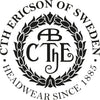Retro Cap Grey
A classic Newsboy Cap with ear flaps in 100% wool.
Retro Sixpence made in our hat factory in Borlänge, Sweden.
Please observe! Large in size, choose one or two sizes smaller than you usually wear.
Detailed information:
- Color: Grey
- Ear flaps
- Made of 100% Wool
- Lining: 100 % Polyester Quilt
- Dry clean only
- Made in Sweden
- Art: 85543
- Mat: 91
- Col: 16
To measure your hat size, wrap a tape measure around your head just above your ears. The tape should fit comfortably – not too tight. Round up to the nearest size.
If you have no tape measure, you can measure with a string, which you then measure with a ruler.
| Head Size (cm) | Head Size (Inch) | Generic Hat Size |
| 54 | 21 1/4 | XS |
| 55 | 21 5/8 | S |
| 56 | 22 | S |
| 57 | 22 1/2 | M |
| 58 | 22,75 | M |
| 59 | 23 1/4 | L |
| 60 | 23 5/8 | L |
| 61 | 24 | XL |
| 62 | 24 1/2 | XL |
| 63 | 24 3/4 | XXL |
This product is made in Sweden and built on a tradition that started already in the year 1885, when Carl Theodor Ericson, fourth generation hat maker, founded the C.Th Ericsons Hat Factory in Borlänge, Sweden.
Over the years, CTH’s high-quality headwear would become a part of Swedish cultural and industrial heritage. Today, almost 140 years later, we are still a family business, our hats are still manufactured by hand and we are still creating modern classics for future generations.
Not much has changed, really. And in that we take a lot of pride.

Design: Sweden
Manufacturing: Sweden
Materials: EU
Shipped from: Sweden
The name comes from the boys who worked selling newspapers on the streets in the late 19th century. In the UK, the model was called Baker Boy cap, but the truth is that the cap was used by more than just "Newsboys" and "Bakerboys". All men, especially from the working class, could wear this type of cap during the heyday of the early 20th century.
The Newsboy cap has a rounder, more generous and bolder shape than, for example, a Flat cap. The iconic shape of the cap is sewn from eight pieces of fabric and has a button in the middle.
Our caps have a handmade quality and timeless style. We always start from traditional shapes, patterns and materials and then adapt them to a contemporary expression.








